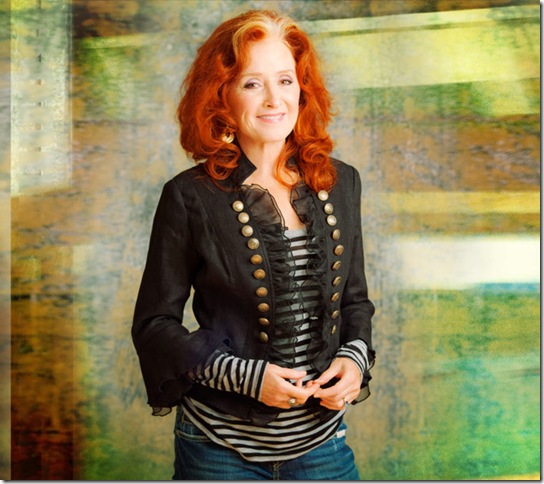Sunday, Oct. 21, was particularly long for Bonnie Raitt.
The day before she and her band had headlined Magnoliafest in Live Oak, and she was hoping for a nice rest in Boca Raton before her show at the Mizner Park Amphitheater. Unfortunately for Raitt, the presidential debate had claimed every room in the neighborhood, so as she noted, they found a hotel “farther up the beach.”
At least she was able to take a swim in the ocean, only to have her reverie interrupted by John Lee Hooker’s One Bourbon, One Scotch, One Beer played reggaeton-style with a soca kicker.
“Only in Florida,” Raitt joked.
Not exactly blues, but it did give Raitt the opportunity to ask the crowd of more than 2,000 if they were ready for A Thing Called Love, the rocking John Hiatt tune on Nick of Time in 1989 that solidified Raitt as one of popular music’s top singers and musicians.
If Raitt, turning 63 Nov. 8, was weary after months of touring to promote Slipstream, her first album since 2005, she didn’t show it. Certainly not on stage, nor after the show, as she spent an hour in cheerful chats with old friends and in down-to-earth discussions with small groups who agree with her politically and socially.
Born into a Quaker family, her roots still run deep. In 1979 she helped found Musicians United for Safe Energy. She’s active in No Nukes. In 2008 she supported John Edwards’ candidacy. She’s an honorary director of Little Kids Rock, which provides free instruments and lessons to schoolchildren.
So if anyone wondered if she’s mellowed in recent years, she left no doubt at the top of the show: “Yeah, I got binders of women for that guy!”
Her musical agenda, however, is dominated by love. Love for everyone: young, old, straight, gay, rich, poor. No restraint, no restriction. After all, blues is life, with all its joy and sorrow – just as she’s lived it, just as she’s imparted it.
Filled with great songs by great composers, Slipstream is classic Raitt and in concert she mixes it nicely with her old hits. It’s not a show for sitting still. Better for dancing, as many did, or standing in one place, snuggling with your partner and rocking back and forth through the likes of a reggae-fied version of Gerry Rafferty’s Right Down the Line, through Bob Dylan’s Million Miles (“I used to think I’d been on the road a long time, but he’s been touring for what, 80 years!”), Joe Henry and Loudon Wainwright’s You Can’t Fail Me Now, to Marriage Made in Hollywood, co-written by her ex-husband, actor Michael O’Keefe (a salute to those who bottom-feed on tragedy).
Since she last toured, Raitt’s parents, brother and best friend died. The album and tour have been not so much cathartic as a need to go back to work, and that need includes a recognition of what they meant to her.
“This old house would’ve burned down a long time ago,” she sang in Angel From Montgomery, acknowledging the sacrifices her mother made and bringing a teary audience to its feet.
The musicians behind Raitt are more like family than band. She lets them shine. Keyboardist Mike Finnigan has known Raitt for decades but was always busy with someone else ― Hendrix; Etta James, Crosby, Stills & Nash; Taj Mahal, Ringo. His turn on Ray Charles’ I Got News for You showed why he’s considered not only one of the best keyboard players on the planet but also one of the best blues singers. Guitarist George Marinelli hooked up with Raitt in 1993, bassist James “Hutch” Hutchinson in the mid-’80s and drummer Ricky Fataar in ’79. That’s definitely family.
Of course, no Bonnie Raitt concert is complete without I Can’t Make You Love Me. It’s become a classic since Raitt recorded it in 1991. “… it’s almost a sacred moment when you share that, that depth of pain with your audience,” Raitt said on NPR in 2002, “because they get really quiet, and I have to summon … some other place in order to honor that space.”
It was eerily silent. Even the din from Mizner Park seemed to disappear as she sang; couples clutched, kissed and cried, ready to “Turn down the lights, turn down the bed.” Then just as quickly, she was firing up again with Have a Heart from Nick of Time, and finally sensing the romance in the area, she closed out with a scalding version of the old Elvis hit, A Big Hunk o’ Love.
Everyone left smiling. No thoughts of politics, no wrestling with misery. With the blues it doesn’t matter; in the end, everything will be better.
